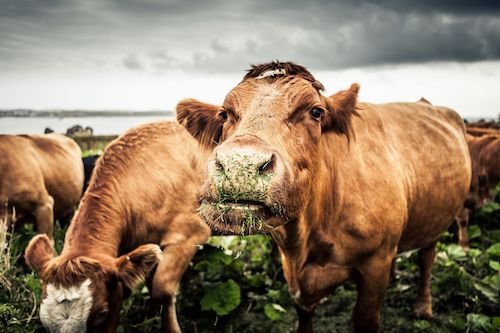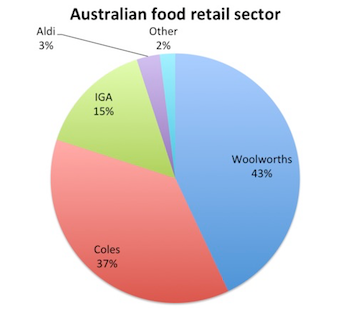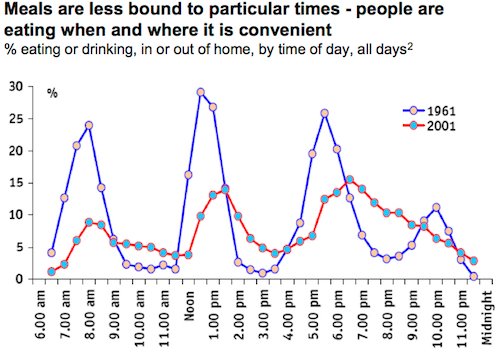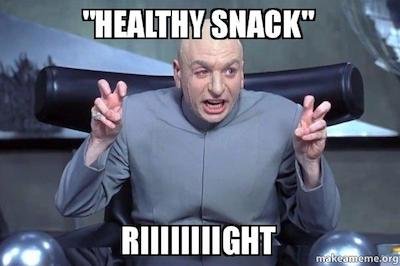Three Meals or Six: Is Grazing the Cause of Obesity? (Drew's Digest #08)
Most of us are familiar with the notion of having three distinct meals each day, but how many of us still eat in this type of structured diet?
Recently there has been an overhaul to this approach of eating, with some favouring the idea of constant grazing spread out across 5 or 6 smaller meals each day. This may work for some people, but personally I prefer to build up an appetite between meals (which makes the food I eat that little bit more enjoyable).

source
A recent food analysis paper from the UK shows the difference between our meal-time trends from two time-points (50 years apart). During that gap in time, the food system has been restructured and is now controlled by the supermarket duopoly (in Australia), which essentially dictate how and what we are able to eat.

source
This level of control, over not only consumers but also farmers, is echoed across most developed countries.

The above graph clearly shows three distinct meal times in 1961, with little consumption between these meals. Fast forward 50 years to where processed, packaged and convenient food options are available everywhere (chemists, stationary, toy and hardware stores etc) and you can begin to see the trend shift to less defined meal times and more ‘grazing’ of foods throughout the day.
Coincidentally (or not), current dietary patterns are fuelling globesity. Could this be caused by consistent energy intake (resulting in more daily calories consumed)? Maybe the total caloric intake is the same for traditional 3 meals versus 6 meals, but the nutritional content of current diets is subpar? Or is it related to the lack of fasting between meals, and not allowing metabolic homeostasis to occur (letting the body chill out after eating)?

source
All of these reasons could be possible, but what it really comes down to is food quality. Sure people that graze may be eating all natural foods and snacking on raw nuts and fruits, but I think a large proportion of the population grazes of convenient, easy to access (mostly processed) foods that contain amounts of fats, sugars and salts that just don’t occur naturally.
Regardless of whether the act of grazing, or the foods being grazed on are causing the obesity problem, one thing is clear. We need to return to an old school style of food system where everything was sourced locally and prepared fresh, rather than relying on the most convenient, energy-dense (lots of calories and little nutrients) foods available. Hit up your nearest farmers market, plan your meals and don’t give in to temptation and convenience.

source
Images are my own, sourced from Pixabay or linked
Drew's Digest #07 - Everything You Ever Need To Know About Broccoli
Drew's Digest #06 - Five Hidden Sources of Vegan Protein 💪
Drew’s Digest #05 - Everything You Ever Need To Know About Lemons 🍋
Drew’s Digest #04 - Vitamin K: The Blood Clotting Compound 🥒
Drew’s Digest #03 - Everything You Ever Need To Know About Pomegranates 😍
Drew’s Digest #02 - How Genetics Will Define Our Future Diets 👨🏻🔬
Drew’s Digest #01 - Everything You Ever Need To Know About Avocados 🥑
CONNECT WITH ME ON

"I think a large proportion of the population grazes of convenient, easy to access (mostly processed) foods that contain amounts of fats, sugars and salts that just don’t occur naturally"
Nail on the head! This IMO is the main reason, a snack, for me anyway, consists of a handful of nuts, a piece of fruit or basically anything that is a whole food.
Keep it up Drew, your smashing it!
This is a very important topic that you have explained well. Obesity and Type 2 diabetes are plaguing the US and Mexico, and I blame 1. added sugar 2. "grazing," like you so clearly explain. Both these raise our insulin levels, giving us insulin toxicity, making us insulin resistant. People are being told to eat lower fat foods and small frequent meals, but that's the wrong advice! It's totally opposite to what we should do! Thanks for bringing attention to this issue.
Thank you for your insight, and I completely agree. The issue comes down to complacency and misinformation. I feel like arming people with correct nutritional knowledge can go a long way and help prevent a lot of the chronic diseases that our society is currently faced with. Thanks again for your reply 🙏
I agree with you. It's important both calorie quantity and quality food.
Absolutely. Being mindful about both is the key
it is amazing a very good post farm animals, be the inspiration who read it
Wow great photography all the images are amazing..... foods looks really good and delicious and yummy thank you for sharing the recipe....
@originalworks